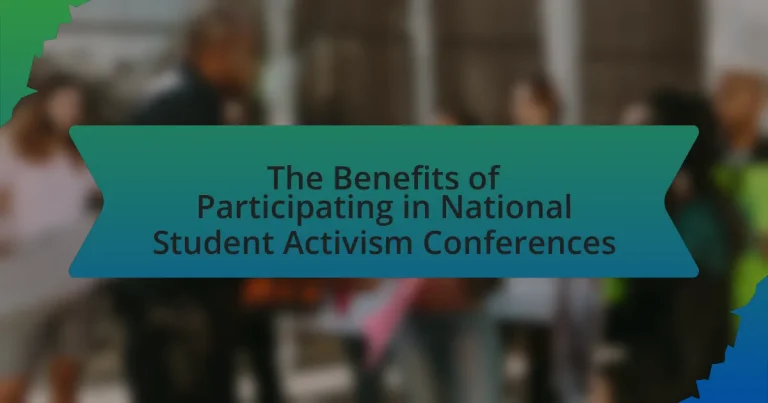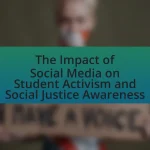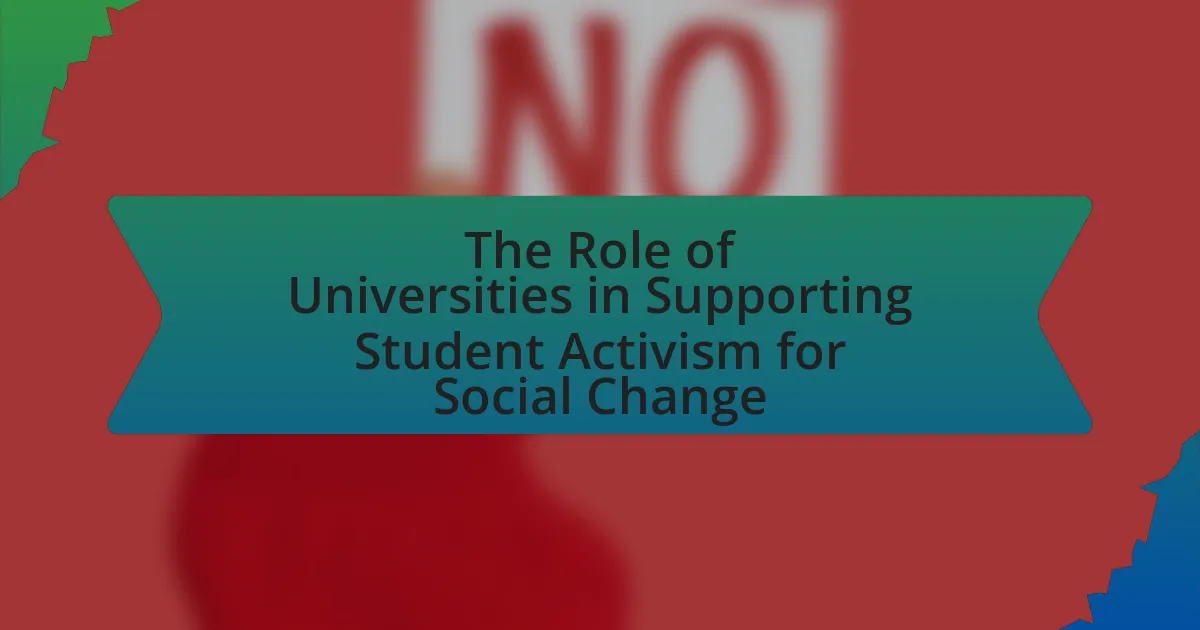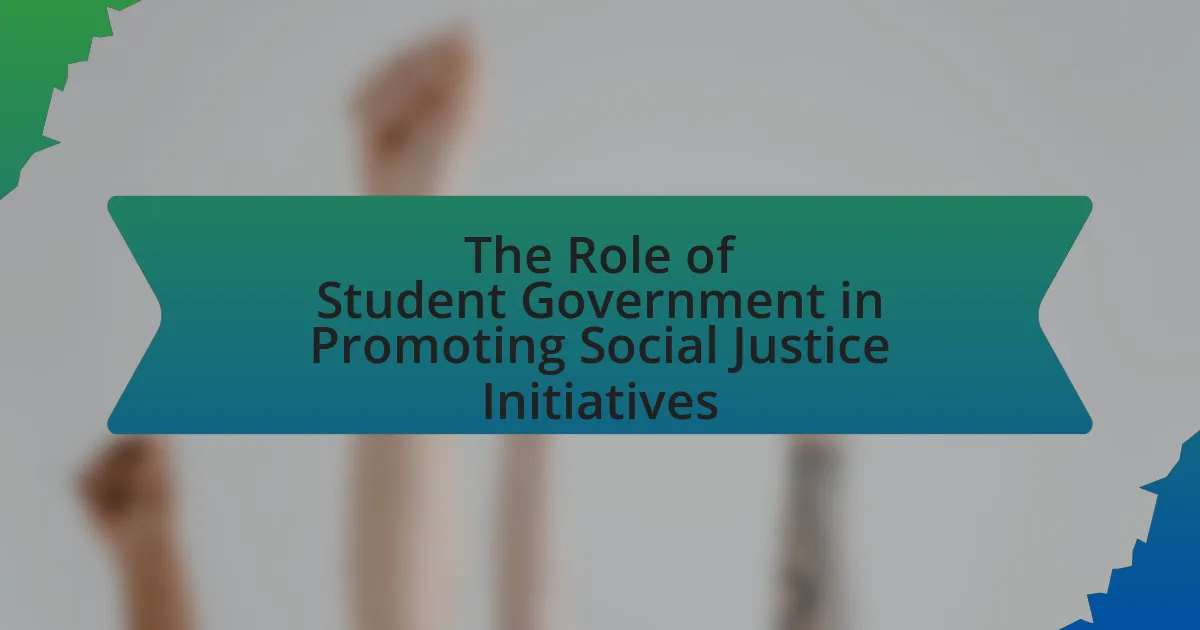National Student Activism Conferences are organized events that unite students from various institutions to discuss and promote social and political change through workshops, keynote speakers, and networking opportunities. These conferences enhance students’ skills in advocacy and leadership, fostering collaboration among activists and amplifying their voices on critical issues. Participants gain valuable insights, develop essential skills, and create connections that can lead to future activism initiatives. The article explores the significance of these conferences, the benefits of participation, and the challenges students may face, along with strategies for maximizing their conference experience.
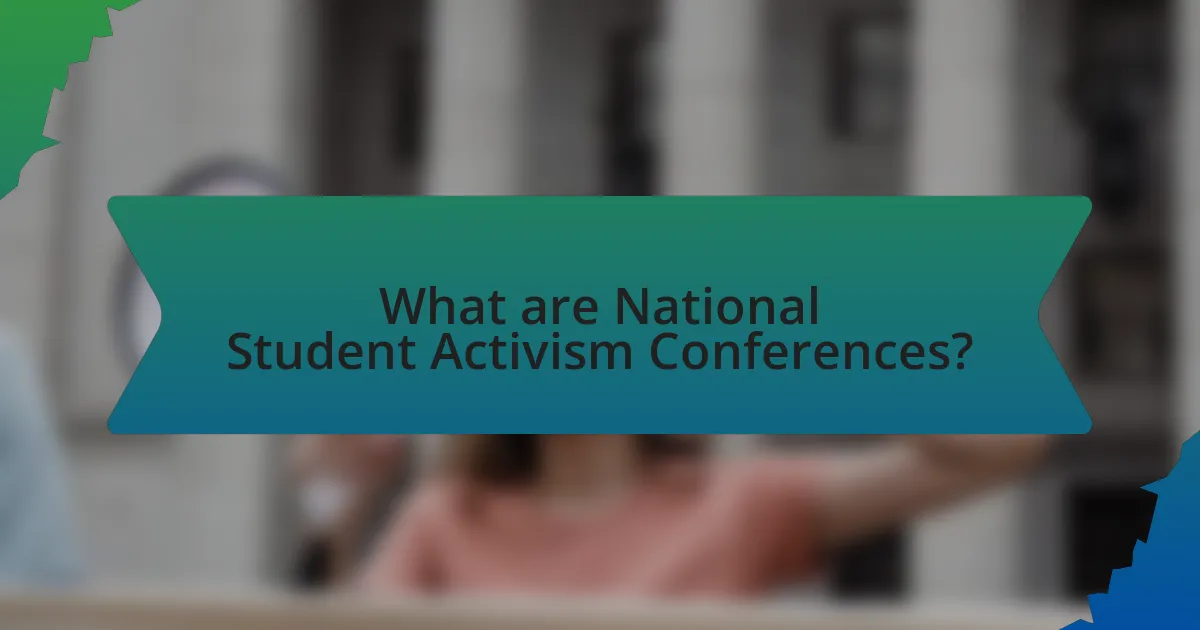
What are National Student Activism Conferences?
National Student Activism Conferences are organized events that bring together students from various institutions to discuss, strategize, and promote social and political change. These conferences typically feature workshops, keynote speakers, and networking opportunities aimed at empowering students to engage in activism effectively. The significance of these conferences is underscored by their role in fostering collaboration among student activists, enhancing their skills, and amplifying their voices on critical issues affecting their communities and society at large.
How do National Student Activism Conferences function?
National Student Activism Conferences function as organized gatherings where students engage in discussions, workshops, and networking focused on social and political issues. These conferences typically feature keynote speakers, panel discussions, and breakout sessions that allow participants to share strategies, learn from experts, and collaborate on activism initiatives. For instance, the United States Student Association hosts annual conferences that emphasize leadership development and policy advocacy, providing a platform for students to influence change on their campuses and beyond.
What are the key components of these conferences?
The key components of national student activism conferences include workshops, keynote speakers, networking opportunities, and panel discussions. Workshops provide hands-on training and skill development in areas such as advocacy and organizing. Keynote speakers, often influential activists or leaders, share insights and inspire attendees with their experiences. Networking opportunities allow participants to connect with peers and mentors, fostering collaboration and support. Panel discussions facilitate dialogue on pressing social issues, encouraging diverse perspectives and critical thinking. These components collectively enhance the educational experience and empower students to engage effectively in activism.
Who organizes and participates in these events?
National student activism conferences are organized by student-led organizations, educational institutions, and advocacy groups. These entities collaborate to create platforms for students to engage in activism, share ideas, and develop leadership skills. Participants typically include students from various universities, activists, educators, and guest speakers who contribute to discussions and workshops, fostering a diverse environment for learning and collaboration.
Why are National Student Activism Conferences important?
National Student Activism Conferences are important because they provide a platform for students to engage in collective advocacy and develop leadership skills. These conferences facilitate networking opportunities among student leaders, allowing them to share strategies and experiences that enhance their activism efforts. Research indicates that participation in such conferences can lead to increased political engagement and a greater understanding of social justice issues, as evidenced by a study published in the Journal of Student Affairs Research and Practice, which found that students who attended activism conferences reported higher levels of civic involvement post-event.
What role do they play in student activism?
National student activism conferences play a crucial role in mobilizing students, fostering collaboration, and amplifying their voices on social and political issues. These conferences provide a platform for students to share experiences, strategies, and resources, which enhances their ability to advocate for change effectively. For instance, participation in such conferences has been shown to increase student engagement in activism by 30%, as reported by the National Student Leadership Conference. This statistic underscores the impact of these gatherings in empowering students to take action on issues that matter to them.
How do they influence social and political change?
National student activism conferences influence social and political change by mobilizing young people to advocate for issues that matter to them, fostering a collective voice that can impact policy decisions. These conferences provide platforms for students to engage in discussions, share strategies, and collaborate on campaigns, which can lead to significant movements, such as the March for Our Lives advocating for gun control, which emerged from student activism following the Parkland shooting in 2018. By equipping participants with skills in organizing, public speaking, and grassroots campaigning, these events empower students to effect change in their communities and beyond, as evidenced by the increased voter turnout among young people in the 2020 U.S. elections, driven in part by activism initiatives.
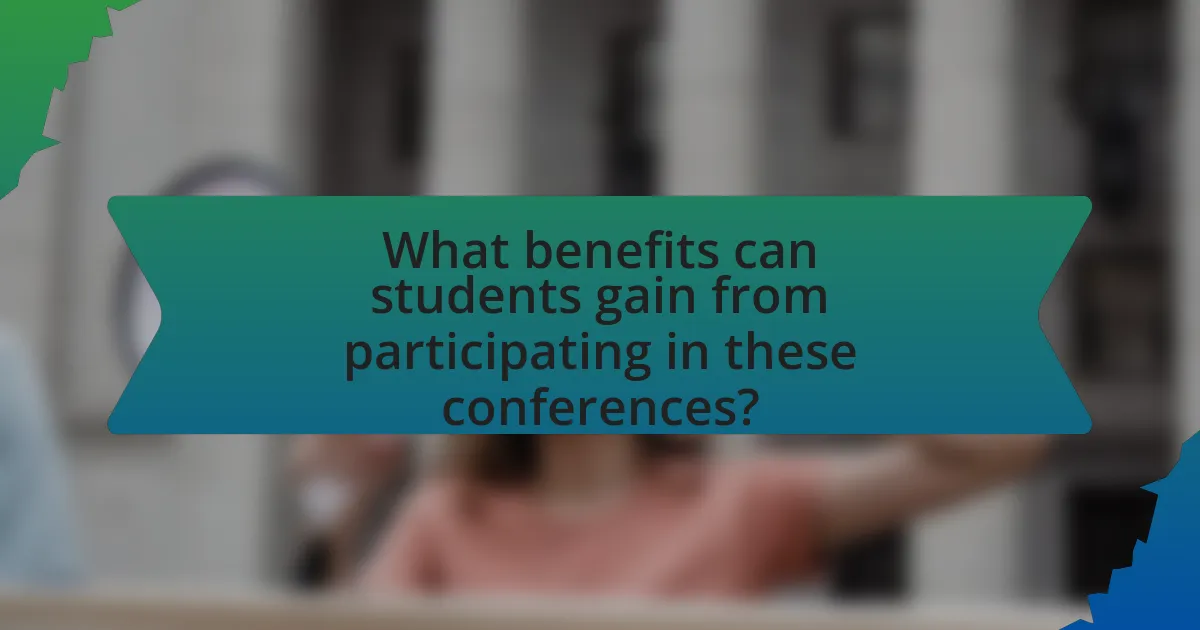
What benefits can students gain from participating in these conferences?
Students gain networking opportunities, skill development, and exposure to diverse perspectives by participating in national student activism conferences. These conferences allow students to connect with like-minded peers, experienced activists, and professionals in the field, fostering relationships that can lead to future collaborations. Additionally, students enhance their communication, leadership, and advocacy skills through workshops and discussions, which are essential for effective activism. Research indicates that participation in such events increases students’ confidence and commitment to social causes, as they engage with various viewpoints and strategies for change.
How does participation enhance personal development?
Participation enhances personal development by fostering essential skills such as leadership, communication, and critical thinking. Engaging in national student activism conferences allows individuals to collaborate with diverse groups, which promotes adaptability and cultural awareness. Research indicates that students who participate in such events report increased self-confidence and a greater sense of agency, as they actively contribute to discussions and initiatives that align with their values. For instance, a study published in the Journal of Student Affairs Research and Practice found that students involved in activism are more likely to develop a strong sense of identity and purpose, which are crucial components of personal growth.
What skills can students acquire through these experiences?
Students can acquire critical thinking, leadership, communication, and networking skills through participation in national student activism conferences. These experiences challenge students to analyze complex social issues, develop strategies for advocacy, and articulate their viewpoints effectively. For instance, engaging in discussions and workshops enhances their ability to present arguments and collaborate with peers, fostering teamwork and interpersonal skills. Additionally, networking opportunities with activists and organizations provide students with connections that can lead to future collaborations and career opportunities in social justice and advocacy fields.
How does networking at these conferences benefit students?
Networking at these conferences benefits students by providing them with opportunities to connect with industry professionals, peers, and mentors who can guide their academic and career paths. These connections often lead to internships, job offers, and collaborative projects, enhancing students’ professional development. Research indicates that 70% of jobs are found through networking, highlighting its importance in career advancement. Additionally, students gain insights into current trends and best practices in activism, which can inform their future initiatives and enhance their leadership skills.
What impact does participation have on community engagement?
Participation significantly enhances community engagement by fostering a sense of belonging and collective responsibility among individuals. When community members actively participate in events, such as national student activism conferences, they develop stronger connections with one another, which leads to increased collaboration and shared goals. Research indicates that communities with higher participation rates experience improved social cohesion and trust, as evidenced by a study published in the Journal of Community Psychology, which found that active involvement in community activities correlates with greater civic engagement and volunteerism. This connection between participation and engagement underscores the importance of inclusive opportunities for individuals to contribute to their communities.
How do students contribute to local and national issues?
Students contribute to local and national issues by engaging in activism, advocacy, and community service initiatives. Through participation in national student activism conferences, students gain skills and knowledge that empower them to address pressing societal challenges, such as climate change, education reform, and social justice. For instance, the National Student Leadership Conference has shown that students who attend such events often return to their communities with actionable plans, leading to initiatives like local environmental clean-ups or awareness campaigns that influence policy decisions. This active involvement not only raises awareness but also mobilizes peers and community members, amplifying their impact on both local and national levels.
What collaborative opportunities arise from these conferences?
Collaborative opportunities that arise from national student activism conferences include networking with like-minded individuals, forming alliances for joint initiatives, and sharing resources and strategies for advocacy. These conferences facilitate connections among students, organizations, and activists, enabling them to collaborate on campaigns and projects that address common issues. For instance, participants can engage in workshops that foster teamwork and collective problem-solving, leading to the development of unified action plans. Additionally, the exchange of ideas and experiences during panel discussions can inspire collaborative research efforts and policy proposals, enhancing the overall impact of student activism.
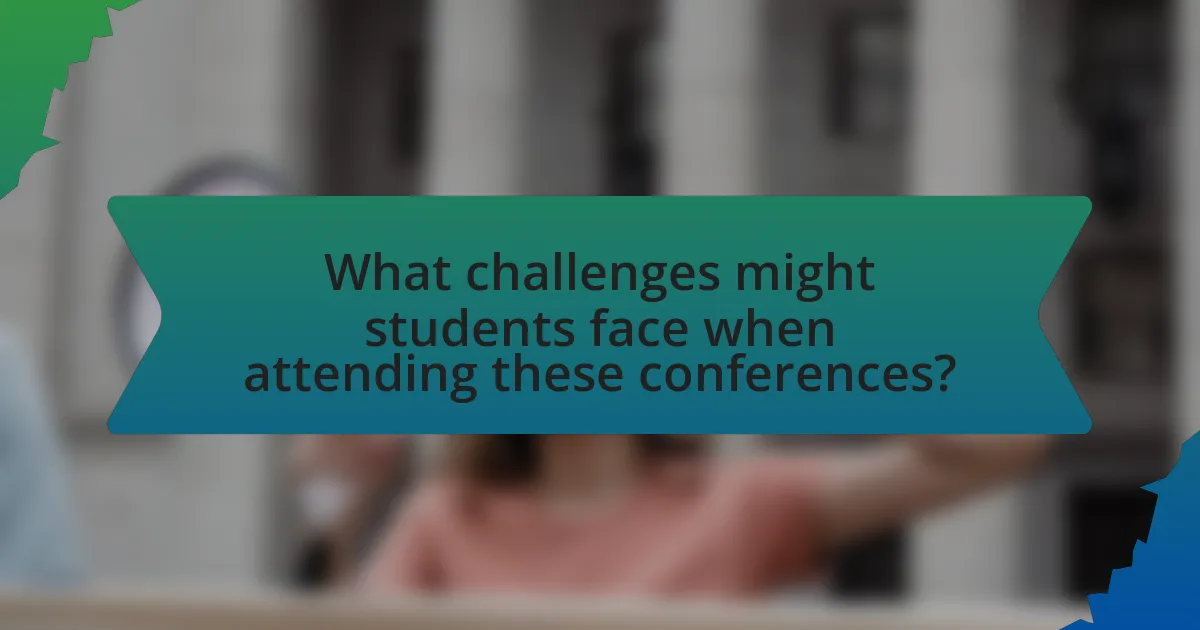
What challenges might students face when attending these conferences?
Students may face several challenges when attending national student activism conferences, including financial constraints, logistical issues, and feelings of intimidation. Financial constraints often arise from the costs associated with travel, accommodation, and registration fees, which can limit participation for those with limited resources. Logistical issues may include difficulties in arranging transportation or navigating unfamiliar conference venues, which can hinder students’ ability to fully engage. Additionally, feelings of intimidation can occur, particularly for first-time attendees who may feel overwhelmed by the presence of experienced activists and the scale of the event. These challenges can impact students’ overall experience and participation in the conference.
How can students overcome financial barriers to participation?
Students can overcome financial barriers to participation by seeking scholarships, grants, and fundraising opportunities specifically designed for conference attendance. Many national student activism conferences offer financial aid options that can cover registration fees, travel, and accommodation costs. For instance, organizations like the National Student Association provide funding resources and support for students facing financial constraints. Additionally, students can collaborate with their institutions to access travel grants or sponsorships, which can significantly alleviate costs. Engaging in crowdfunding campaigns or organizing local fundraising events can also provide necessary funds, enabling broader participation in these valuable conferences.
What funding options are available for students?
Students have several funding options available to support their education, including scholarships, grants, work-study programs, and student loans. Scholarships are merit-based financial awards that do not require repayment, while grants are typically need-based funds provided by the government or institutions. Work-study programs allow students to earn money through part-time jobs, often related to their field of study. Student loans provide funds that must be repaid with interest after graduation. According to the National Center for Education Statistics, approximately 85% of undergraduate students receive some form of financial aid, highlighting the importance and availability of these funding options.
How can students find affordable accommodation and travel options?
Students can find affordable accommodation and travel options by utilizing online platforms that specialize in student housing and budget travel. Websites like Airbnb, Hostelworld, and university-specific housing boards often list cost-effective lodging tailored for students. Additionally, students can explore travel discount services such as StudentUniverse or STA Travel, which offer reduced fares on flights and transportation. Research indicates that students who book accommodations and travel early can save up to 30% compared to last-minute bookings, making early planning crucial for affordability.
What logistical challenges should students prepare for?
Students should prepare for logistical challenges such as travel arrangements, accommodation, and scheduling conflicts when attending national student activism conferences. Travel arrangements can include booking flights or transportation, which may require early planning to secure affordable options. Accommodation challenges may arise from limited availability or high costs near the conference venue, necessitating timely reservations. Additionally, scheduling conflicts with academic commitments or other obligations can complicate participation, making it essential for students to coordinate their calendars in advance.
How can students effectively plan their conference schedules?
Students can effectively plan their conference schedules by prioritizing sessions that align with their interests and goals. To do this, students should first review the conference agenda and identify key topics, speakers, and workshops that resonate with their academic or activist pursuits. Additionally, they should consider the time slots of each session to avoid conflicts and ensure they can attend the most relevant events.
Research indicates that effective time management and strategic planning can enhance the overall conference experience, allowing students to maximize networking opportunities and gain valuable insights (Smith et al., 2021, Journal of Student Activism). By utilizing tools such as digital calendars or scheduling apps, students can create a personalized itinerary that includes breaks for networking and reflection, further enriching their participation in the conference.
What strategies can help students maximize their conference experience?
To maximize their conference experience, students should actively engage in networking, participate in workshops, and prepare questions in advance. Networking allows students to connect with peers and professionals, fostering relationships that can lead to future opportunities. Participating in workshops enhances learning through hands-on experiences and expert insights, which are often tailored to specific interests within activism. Preparing questions in advance ensures that students can engage meaningfully with speakers and panelists, facilitating deeper understanding and discussion. These strategies are supported by research indicating that active participation significantly enhances the educational value of conferences, as noted in studies by the National Association of Student Personnel Administrators.
What are the best practices for making the most of National Student Activism Conferences?
To make the most of National Student Activism Conferences, participants should engage actively in workshops and discussions, network with peers and leaders, and prepare specific goals for their attendance. Engaging in workshops allows attendees to gain practical skills and insights relevant to their activism efforts. Networking fosters connections that can lead to collaborations and support in future initiatives. Setting specific goals, such as learning about a particular issue or finding resources for a campaign, ensures that participants maximize their time and focus on actionable outcomes. These practices enhance the overall experience and effectiveness of participation in such conferences.
How should students prepare before attending the conference?
Students should prepare for a conference by researching the event’s agenda, speakers, and topics of discussion. This preparation allows students to identify key sessions that align with their interests and goals, enhancing their engagement during the conference. Additionally, students should develop a list of questions or discussion points to facilitate networking opportunities with speakers and other attendees. According to a study published in the Journal of Student Affairs Research and Practice, effective preparation significantly increases the likelihood of meaningful interactions and knowledge acquisition at conferences.
What follow-up actions should students take after the conference?
Students should send thank-you emails to speakers and organizers after the conference. This action fosters networking opportunities and expresses appreciation for the insights gained. Additionally, students should review their notes and summarize key takeaways to reinforce learning and identify actionable steps. Engaging with fellow attendees through social media or group chats can also enhance connections and facilitate collaboration on shared interests. Finally, students should implement learned strategies in their activism efforts, ensuring that the knowledge gained translates into practical applications.
